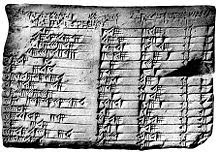For example, it is obviously true that
2 + 3 = 3 + 2
This arithmetic statement can be generalized using algebra to
x + y = y + x
where x and y can be any number.
*Algebra has been studied for many centuries.
HISTORY OF ALGEBRA
 Egyption & Babylonian Algebra
Egyption & Babylonian Algebra- Babylionian and ancient Chinese and Egyption mathematicians propose and solved problem in words, that is, using "rhetorical algebra".
- The Cairo Papyrus of about 300 B.C. indicates that by this time the Egyptians could solve some problems equivalent to a system of two second degree equation in two unknowns.
- The mathematics of the Old Babylonian Period (1800-1600 B.C) a general procedure equivalent to solving quadratic equations (using the quadratic formula).
sources :http://www.math.ubc.ca/~cass/courses/m446-03/pl322/pl322.html (how to read it)
Greek & Diaphontine Algebra
 Cover of the 1621 edition of Diaphantus' Arithmetica, translated into Latin by claude Gaspard Bachet de Meziriac.
Cover of the 1621 edition of Diaphantus' Arithmetica, translated into Latin by claude Gaspard Bachet de Meziriac.
sources : http://en.wikipedia.org/wiki/File:Diaphantus-cover.jpg
sources :http://en.wikipedia.org/wiki/The_Compendious_Book_on_Calculation_by_Completion_and_Balancing
Abstract Algebra
- Varius algebraic identities and constructions equivalent to the solution of quadratic equation were expressed and proven in geometric form (irrational numbers still not recognized).
- In the 3rd century, the Greek mathematician Diaphantus of Alexandria wrote his book Arithmetica.
- Diaphantus gave gives a treatment of indeterminate equation - usually two or more equations in several variables that have an infinite of rational solutions.
sources : http://en.wikipedia.org/wiki/File:Diaphantus-cover.jpg
Arabic Algebra
- The first mention of the world "algebra" is to be found in the tittle of a work by Mohammed Ibnu Musa Al-Khwarizmi - beginning of the 9th century (780-850).
- The word "algebra" come from the tittle of his text book in the subject, Hisab al-jabr w'al muqabalah or The Compendious Book on Calculation by Completion and Balancing.
- Presented the first systematic solution of linear and quadratic equation.
- The poet/mathematician Omar Khayyam (1050-1130) made significant contributions to the solution of cubic equations by geometric methods invollving the intersection of conics.
sources :http://en.wikipedia.org/wiki/The_Compendious_Book_on_Calculation_by_Completion_and_Balancing
Abstract Algebra
- started in 19th century by British mathematicians.
- the development of non-commutative algebras.( The first example of such an algebra were Hamilton's quaternions - 1843.)
- Peacock (British, 1791 - 1858) was the founder of axiomatic thinking in arithmetic and algebra.
- DeMorgan (British, 1806 - 1871) extended Peacock's work to consider operations defined on abstract symbols.
- Cayley (British, 1821 - 1895) developed an algebra of matrices (this is a non-commutative algebra).
- Galois (French, 1811 - 1832) give a definitive answer to the broad question of which polynomial equations are solvable by algebraic operations.
- The concept of a field was first made explicit by Dedekind in 1879.







0 comments:
Post a Comment